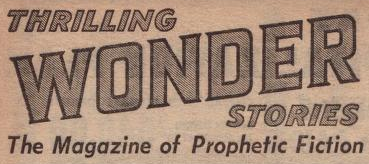Short Reviews – No Winter, No Summer, by Damon Knight and James Blish (as Donald Laverty)
Friday , 19, May 2017 Uncategorized 2 CommentsNo Winter, No Summer, by Damon Knight and James Blish (writing as Donald Laverty) appeared in the October 1948 Issue of Thrilling Wonder Stories.
While there were a couple stories in this issue that I didn’t like, particularly Bradbury’s “crazy people aren’t crazy if you stick them in an environment that nurtures and caters to their crazy”, this was the only one that was not only disagreeable but felt wholly out of place in the magazine. Somehow, I find myself not surprised when I find James Blish and Damon Knight behind pseud.
Time Travel is real and the future is slowly conquering the past. A bland and hyperhomogenized evolved state of man has replaced every inch of earth with a great city; all energy is directed toward expanding man’s habitat and removing any impediments to it.
An appreciation for art and literature have been nearly bred out of the race, and those who have it are seen as aberrations; they keep them frozen most of the time and only break them out to scout out time periods and make captives from those times slightly more comfortable while interrogating them and preventing contamination of the general populous.
I guess that the masterminds of the future have to get permission from the past to future-conquer it, because they’ve kidnapped an engineer, and after some time with the aberrants, the elder master of time travel gives a ‘you must consent, this is your future, we can make it your now’ speech. The engineer pretends to agree, steels a spaceship and uses it to nuke earth and wipe out humanity because ‘zomg, wut have we b-cum?’
On top of being downer, not particularly well written or exciting, there’s a good bit of muddle in the portrayal of the dystopia. At times, you can’t tell if they think parts of it are good or bad; I mean, I assume bad, since the happy ending is nuking mankind out of existence, but look at this mess:
If I’ve given the impression that the world was a soulless ant-heap, I didn’t mean to. The work went on, all the time, and everyone contributed to it; but except for a few top executives, no single person worked more than four hours a day, nor more than three days a week. Except for the rapid expansion of this civilization the figures would have been even lower. And there was plenty of spirit. Every job was undermanned, so a citizen could pick any one that suited him when he came of age, and be free to change his mind later. The vast projects under way held the enthusiasm and imagination of the people the way only myths had held them in my own time.
Holy heaps of contradiction, Batman! Somehow, every job can be undermanned but no one works more than 12 hours a week and somehow no one’s spirit is sapped? Nevermind that we’re explicitly told later than the main character never actually meets anyone in the city except for his couple of handlers and the Overlord guy, this is some pretty dumb and contradictory stuff in its own right! Just who is it wanking over this non-existent worker’s paradise that was both great and needed to be nuked at the same time?
Look, this earth would be paradise, if the commie overlords would force everybody to read, examine, and appreciate state approved art and literature. The drones would then have souls.
-
See, that’s the weird thing, though. With the exception of the aberrants, no one has an appreciation for art and literature. The one who captures the narrator in this one is rewarded with a little volume of poetry before he’s tossed back into the cryovats again, because it’s the one carrot they can use to get the aberrants to help them literally destroy the past.
I don’t know if it’s because it was written by two writers or if it’s just badly written, that the narration goes back and forth quite a bit on whether this future is a paradise (which the narrator assures us here) or a horrible dystopia that needs to be nuked (which the narrator does).
It’s like “you nuked mankind out of existence because it was a soulless ant-heap, but after you escaped back to the present to tell the story of why you destroyed the human race, you assure us that it wasn’t a soulless ant-heap!”